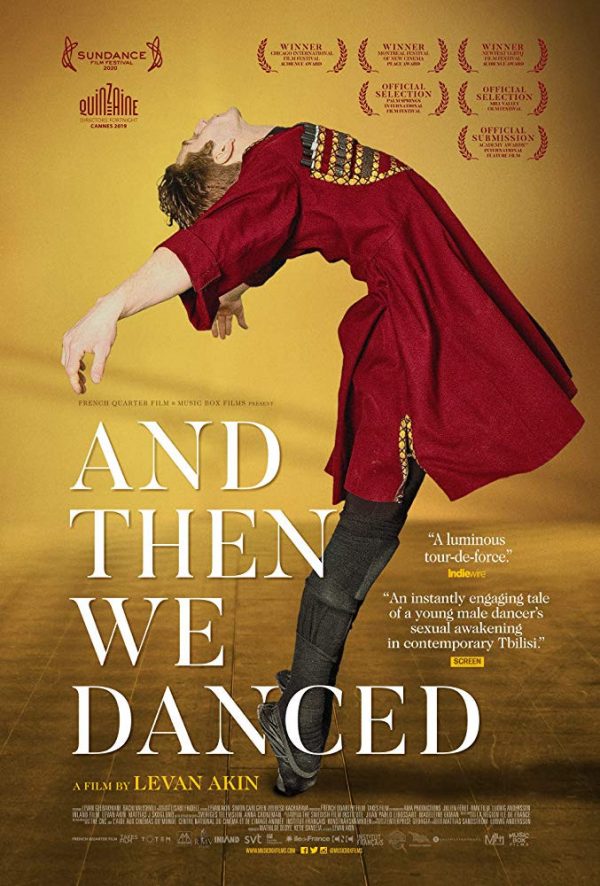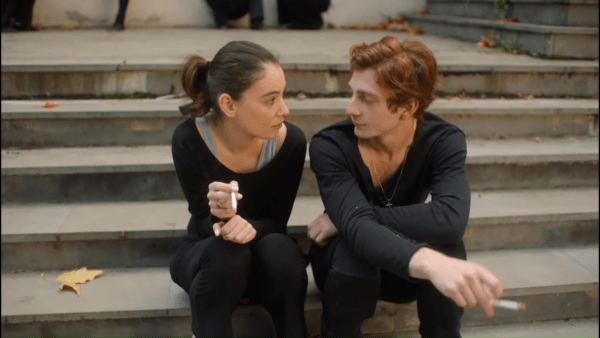And Then We Danced, 2019.
Directed by Levan Akin.
Starring Levan Gelbakhiani, Bachi Valishvili, Ana Javakishvili, Giorgi Tsereteli, and Tamar Bukhnikashvili.
SYNOPSIS:
A passionate coming-of-age tale set amidst the conservative confines of modern Tbilisi, the film follows Merab, a competitive dancer who is thrown off balance by the arrival of Irakli, a fellow male dancer with a rebellious streak.
That dancers will basically wreck their bodies for an art form which will chew them up and spit them out once they’ve approached an age that’s considered slightly less than young is pretty much a given. Unfortunately, the ones in the Georgian film (the European country, not the U.S. state) And Then We Danced have even less of a reward for their obsessive devotion. Why? Well, apparently Georgia not only thinks it can have dance without sex, but arts without gays.
Needless to say, their programs aren’t in the best of shape when the film begins. In a time when other nations and industries are struggling to incorporate diversity rather than the irrelevance which always threatens, the various dancers seem rather amused at their elders’ insistence on their brand of purity and virginity. For the competitive Merab (Levan Gelbakhiani), who dreams of the kind of stardom few in his family have approached, let alone accomplished, it’s no laughing matter. Especially when Irakli (Bachi Valishvili), a dreamboat if there ever was one, enters his life just as an opportunity both new and rare beckons. In spite of the very real consequences any relationship could incur, Irakli is soon getting a bit too close for Merab’s comfort, but as Merab begins to embrace his desires, his eagerness begins to surpass Irakli’s. No, their dances aren’t supposed to be sexual, but tell that to their chemistry.
Yet brutal reality is always ready to encroach on Merab’s dreams. He also has to work in addition to devoting himself to his craft, and his family, most of whom danced themselves, are living reminders of what could await Merab even if he succeeds. As Merab becomes more comfortable with his identity, he also exhibits a denial that’s equal frustrating and baffling, given that his country embraces the kind of conversion therapy that takes place in remote monasteries, where abuse is apparently rampant. And Then We Danced likewise somewhat softens the blow that could fall, surrounding him with people who mostly show concern for him, including his girlfriend Mary (Ana Javakishvili), who of course is somewhat underdeveloped, even if she is a continual presence. If Merab has more of a chance, it’s mostly due to circumstance, such as the brother who is capable of caring for the family Merab knows he must leave if he’s going to have any kind of chance at a future. That realization, along with his departing statement, a dance which embraces a fluid sexuality where he reclaims the Georgian identity that doesn’t want to claim him, feels like a triumph, an opportunity his home is refusing to take, but more welcoming environments are sure to embrace.
Flickering Myth Rating – Film: ★ ★ ★ ★ / Movie: ★ ★ ★ ★
Andrea Thompson














